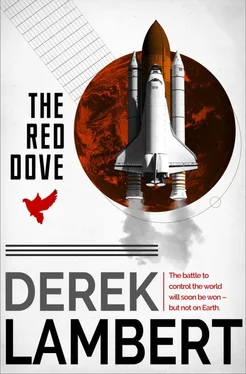‘With beams.’
‘With beams,’ Sedov agreed. ‘The Americans have got them, we’ve got to have them.’
‘CPBs?’
Sedov’s expression tightened. ‘The weapons of the future. We can’t be left behind.’
‘The rumours,’ Talin said, feeling for words, ‘say that the CPBs are to be aimed at the Earth. Had you heard that?’
‘They’re adaptable. They can be fired up or down.’
‘If they were fired at the Earth that would start a nuclear war.’
‘Or stop it. If the beams were aimed at the American launching sites.’
‘And their submarines?’
‘I’m not a beam ballistics expert,’ Sedov said. ‘What was the source of these rumours?’
But, with cold frosting his soul, Talin kept at him. ‘The rumours also concerned Dove itself.’
There was a new wariness in Sedov’s voice as he said, ‘Really?’ Talin thought: He knows.
‘They say that Dove will be armed with a conventional nuclear bomb.’
Deny it! Please God deny it.
Sedov took a mouthful of vodka, held it in his mouth for a moment, then said: ‘I think you deserve an explanation.’
Hope withered.
Sedov said: ‘The Americans have orbital bombs in space… we have to make some sort of reply… we must always be ahead….’ For the first time that Talin could remember Sedov’s voice had lost its way. ‘…a deterrent, no different in that respect to a missile armed with a nuclear warhead…’
Talin said: ‘Don’t give me shit, Oleg.’ He held out his glass; Sedov filled it. ‘Something I’ve always wanted to do,’ Talin said. He drank the vodka and hurled the glass at the wall.
That night Talin dreamed that he and Sonya and their two blond children, a boy and a girl, sought refuge from a nuclear holocaust in a mine. But it was a cobalt mine and there they met his father. ‘Like me,’ he told them, ‘you have two chances – to die slowly down here or quickly up there.’ When he turned Talin saw that the sockets of his eyes were empty.
Sonya took Lisa’s hand; he took Viktor’s. They began to ascend through a tunnel towards quick death. ‘Where are we going?’ Viktor asked. ‘Fishing,’ Talin answered.
On Friday the thirteenth, the eve of the launch, Robert Massey watched a gaunt-faced Sergei Yashin make the last computer connection with Vandenberg and, indirectly, all the military mission control centres in the US. Vlasov was also there, accompanied by Moroz and Peslyak, the three godfathers of Soviet espionage. Which was hardly surprising, Massey reflected, in view of the fact that, assisted by aerospace experts, they believed they were programming Vandenberg to destroy all American military and spy satellites in space plus any on the ground that could be launched to replace them.
Occasionally Massey became aware that Vlasov’s greenish eyes were staring at him speculatively. Wondering why he had twice eluded his tail? My presence here today, Massey thought, should convince him that it was chance; but Vlasov wasn’t a man who readily accepted chance.
Tomorrow he will know just how right he was to doubt. And he will also realise that it wasn’t coincidence that the Vandenberg penetration had coincided with the Dove launch. It had been planned that way as a means of creating chaos, a stroke of timing by Vlasov’s only equal in the world, George Reynolds.
That evening Talin telephoned Sonya.
Breathlessly, she told him that she was in the middle of the dress rehearsal for The Red Dove that was to have its première at the Bolshoi tomorrow ‘while you circle the world.’
He said: ‘I telephoned to tell you that I love you.’
‘And I love you. Perhaps when we’re together again—’
Perhaps what he never knew because he cut the connection and closed his eyes.
Blast off was scheduled for 10 a.m. Talin was called at six but the call wasn’t necessary: he hadn’t slept. And still he didn’t know what he was going to do.
His conscience said defect; his birthright said stay. He looked into the bathroom mirror and saw a saint, he looked again and saw a traitor. Indecision ebbed and flowed. He bent to rinse his face in the basin – and vomited.
He took his pulse. It was strong enough but too fast so he took a tranquiliser in the hope that it would deceive the monitors at Launch Control.
A car arrived to pick him up at seven. The driver talked incessantly but Talin hardly heard him. He was glad that it was still dark because he didn’t want to look at the land, flat and dull though it was, in case he never saw it again. He hoped it would snow; the satellites had forecast a snow-free launch but they were frequently and dramatically wrong. Yes, snow would help. To keep him here or to store as a memory?
At 7.55 Talin, Sedov and their two passengers, a scientist and a military observer described as a meteorologist, arrived at the floodlit launch-pad, wearing their red flight jackets, a far call from the cumbersome suits the space pioneers had worn. They carried their white helmets fitted with radio headsets under their arms.
Dove, Talin thought, looked peculiarly vulnerable, dwarfed by the two rockets and the fuel tank to which she was locked. Not until they were jettisoned after the launch would she come into her own, a high-flying bird of infinite grace.
One day carrying in her womb a lethal egg. How could men perpetrate such a travesty?
As he stood at the foot of the skeletal access tower acknowledging the applause of the ground staff, Talin noticed another pool of floodlight in the distance: the complex where they had installed ground-to-air beam weapons.
A cold wind blew in from the east polishing the stars. Sedov took Talin’s arm and they entered an open-fronted elevator which whisked them to Dove’s entry hatch.
With the two passengers seated behind them – all of them now had their backs parallel to the ground because Dove was mounted on its tail – Talin and Sedov checked their life support systems and began their pre-launch checks. They tapped out queries on one of the spaceship’s four computers; immediately the answers flickered back, green and phosphorescent, on the two screens in front of them.
As the computerised countdown continued the great tank clamped to the exterior of Dove filled with liquid oxygen and hydrogen.
Talin remembered his excitement during the previous countdown; today it was rasped by an intrusive quality. Fear. Of what he might do.
Could they pick up this new tension on the monitors?
Through the headset attached to his helmet came the voice of the Launch Controller: ‘Any messages for the Russian People?’ Like the first Dove’s maiden flight this mission was being followed throughout the Soviet Union and Warsaw Pact countries on radio and television.
The public knew that this Dove was equipped with a steel-jointed arm to deposit and pick up satellites; they knew that it was capable of re-launching itself into orbit if anything went wrong as it re-entered the earth’s atmosphere. That was all they knew.
What I should tell them, Talin thought, is that this launch should be made from Plesetsk, the base between Moscow and Archangel from which military missions were launched.
He felt Sedov’s stare.
The Launch Controller’s voice came on again: ‘Do you read me, Comrade Talin?’
‘I read you. Tell them I’m proud to have been chosen to represent them once again in space. That I’m looking forward to returning…’
To where?
‘And a message for your wife?’
This time he played it their way. ‘Tell her I love her.’
After the confrontation six days ago Talin had been scared that Sedov would make a report to his superiors.
Читать дальше
Конец ознакомительного отрывка
Купить книгу












